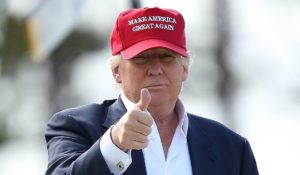Predictable Exits: Trump and the Paris Agreement

The distress caused by US President Donald Trump in over the last week continues the theme of exit: old alliances and agreements need revision; compacts need unpacking. Thursday saw Trump add another graceless if direct announcement: the United States would be leaving the Paris climate agreement.
“This agreement,” he claimed in a speech of fantastic make-believe, “is less about the climate and more about other countries gaining a financial advantage over the United States.”
And so, we return to the language of competition – usually deemed unfair when it comes to US interests.
Trump’s tactics on this are foolish and nostalgic (they, at points, combine). The sentiment that jobs are to be found in the bosom of the coal industry is naïve, but it also suggests a poor understanding of current economics.
Between 2011 and 2016, US coal production fell by 27 per cent. The greatest reason was natural gas, lessening demand, renewable energy and the assortment of Obama-era regulations.[1] A few US coal producers had to also admit that their game would have to change. The Paris accord, claimed Peabody Energy, Arch Coal and Cloud Peak Energy, could still be abided by.[2]

Source: nationalreview.com
A far better approach, in so far as Trump was pretending to be pragmatic, would be to economise on the green boom. Make America Great Again at the tip of a Green Spear. But such an approach jars with the masculine punchiness of digging into the earth, and renting it into impoverished oblivion. To make that case, think tank fraternities have insisted on the unnecessary shackling that the Paris accord inflicts. Abide by such arrangements, they warn, and energy prices are bound to rise.
Furthermore, the climate change combat regime is inherently flexible. Much mischief could have been made within it, given its aspirational context. The Paris accord, for all the effusive fanfare, is non-binding, easy to cast off or modify in the event states wish to revise their commitments as unduly onerous. There would be much room for the cynics to manoeuvre.
That particularly point was ignored, possibly with a mixture of malice and ignorance, in a May letter to Trump signed by twenty-two Republican senators, including Senate Majority Leader Mitch McConnell.[3] Remaining in the Paris Agreement, they warned,
“would subject the United States to significant litigation risk that could upend your Administration’s ability to fulfill its goal of rescinding the Clean Power Plan.”
Trump’s speech similarly replicated this cobwebbed error, one that admits to the Paris accord being “non-binding” and yet an imposition of “financial and economic burdens” that are simply “draconian”.
Industry conglomerates have duly insisted that the environmental effort is something they can do outside the stifling channels of a presidential administration. General Electric’s Jeff Immelt was one such figure:
“Climate change is real. Industry must now lead and not depend on government.”
The other response to Trump is also a variant of charged hope, pure and distilled in what seems like a shaman’s brew. It reeks of a desperate counter, a sense that, even if the United States is not on board, the rest will still persevere. The rest, in this case, tend to be the bulk of Europe, and China. (Within the United States, states and cities promise to pull their weight.)
French President Emmanuel Macron, who is fast filling a vacuum of anti-Trump desperation, decided to reverse the Trump slogan. Speaking officially in English, a language pooh poohed by French officialdom and Gallic stiffness, Macron suggested that the time had come to “make the planet great again”.
Germany’s Angela Merkel dug into the religious fold and linked planet earth with the divine.
“To everyone for whom the future of our planet is important, I say lets continue going down this path so we’re successful for our Mother Earth.”
The environmental side of things are far from the only matters at stake here. Green matters are also political ones, and slipping away from the Paris agreement will leave a vacuum that will be filled, one way or another.
China remains posed to assume the mantle, which will provide endless grist to the public relations mill. But even the PRC faces its own internal battles and battlelines, notably in the area of state-owned coal companies.
The last time such a sentiment found form was the founding of the League of Nations, a body that would, in the duration of its troubled life, constantly wish for US participation. Caught in its state of normalcy, as the term came to be known, the United States went into something of international hibernation from 1919. It would only wake up with a violent Japanese jolt at Pearl Harbour in 1941.
The ensuing participation in the Second World War, when the League had, effectively, been charred beyond recognition. For irreconcilable pessimists, the next charring may well be underway, only this time on a far more global scale.
Dr. Binoy Kampmark was a Commonwealth Scholar at Selwyn College, Cambridge and lectures at RMIT University, Melbourne. Email: [email protected].
Notes
[1] http://energypolicy.columbia.edu/publications/report/can-coal-make-comeback
[2]https://www.vox.com/energy-and-environment/2017/6/2/15723988/winners-losers-trump-paris
[3] https://www.inhofe.senate.gov/download/paris-letter
Featured image: schweitzfinance.com

